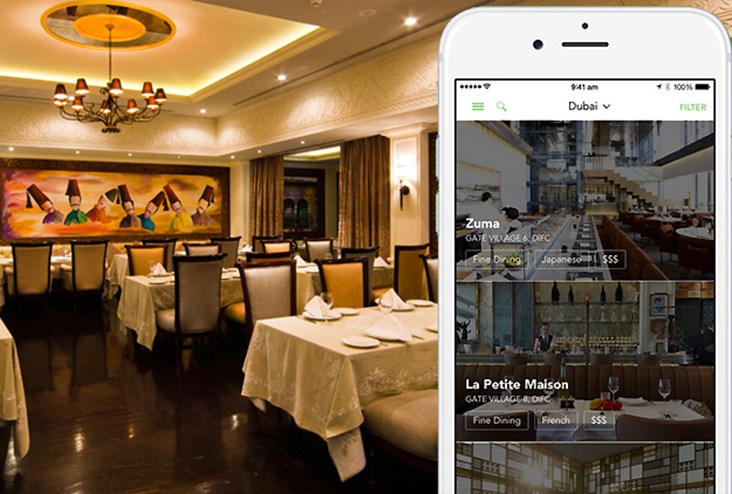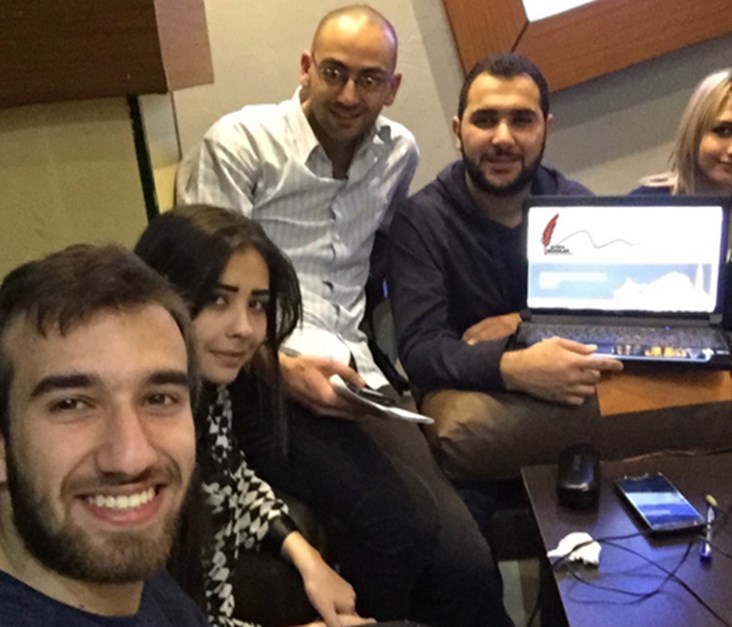
After conquering the Bahraini market, the online fine dining reservation mobile app, eat, has taken its confident first step into the UAE market, and is planning further expansion in the GCC and Middle East.
eat had partnered with 92% of fine-dining restaurants in its home market, amidst competition from heavyweights such as TripAdvisor, TimeOut, and DineOut Bahrain.
The newcomers are betting on their app’s advanced features and usability to capture a sizeable share of the highly competitive UAE market.
Angels Bankrolling Expansion
eat was launched in 2015 in its home market of Bahrain, with equity-based funding from a group of private Bahraini investors. Additional investments came from Bahrain’s Business Angles Company Tenmou and 500 Startups’ Middle Eastern partners.
So far, eat has spent most of its investments on product research, development, and optimization. It has closed 2 rounds of seed funding worth $300,000 and $400,000 respectively, which it used to expand its user and restaurant acquisition and retention in Bahrain, as well as continue product development.
With a strong product and base of operations, eat began increasing its marketing expenditure to prepare for expansion.
“Dubai was always going to be the next big step for eat, but when we heard that some of our larger global competitors were planning to enter the UAE, we had to fast-track our expansion and managed to raise a third round of $400,000 to get us started as quickly as possible and acquire market share,” said Nezar Kadhem, co-founder of eat.
eat is now going through the final stages of a Series A round, which aims to raise $2-$2.5 million for its next stage of growth. The next 2 cities slated for eat’s expansion are Abu Dhabi and Doha. The startup is targeting all 6 GCC countries and select Middle Eastern markets.
Kadhem added that they have seen growing demand for their technology from restaurants in Australia, the UK, and Mexico, among others.
“We plan on launching more web-focused technologies that will allow eat to cater to restaurants all over the world. We want to build a system enabling us to onboard and support restaurants over the web without the need to be physically present in those markets,” said Kadhem.
A Mobile-First Model
The founders first focused on the development of the restaurant reservation management platform on iOS (for iPads). “This was a strategic decision as apple’s technology is extremely well suited for the kind of user experience we wanted to provide; efficient, light weight, mobile, the ability to synchronize multiple devices in real time and develop a native application,” said Kadhem.
The restaurant discovery and real-time reservation app came later, and once it was perfected, the startup developed an Android version.
The GCC market’s high smartphone penetration rate dictated eat’s app-first approach. The startup’s proprietary user data also showed that 70% of traffic originated from mobile devices, versus 30% from desktops, “Our own data formed the underlying motivation for focusing on developing iOS and Android apps prior to also incorporating a web platform,” said Kadhem.
According to Kadhem, users of eat’s mobile app are repeat users who have already experienced how easy it is to book a table at their favorite restaurant via their smartphone. “However, there also is a market of people whose online behavior is more oriented towards desktop search engines for finding restaurant booking information, and that is where the web platform comes in,” he said.
After achieving sizable traction with their app, the founders will launch a web reservation platform by end-2016 to target even more users and increase conversion.
Facing the Competition
Restaurant discovery applications like TripAdvisor, TimeOut, and DineOut Bahrain already existed in Bahrain. eat successfully stood out in that market by giving customers the ability to book a table in real time. It also offers a curated list of fine dining venues. These automatically include restaurants that are part of 4 or 5-star hotels, while standalone eateries go through a more complex checklist.
In Dubai, around 100 restaurants are currently taking reservations via the eat app (out of an approximate 600 fine-dining venues identified). These include the Palazzo Versace, the Taj Group of Hotels, the St Regis, the Kempinski Group, the Oberoi, the Address Dubai Marina, the Radisson Blu, the Shangri La, the Billionaire Mansion, the Cavalli Club, The Meat Company, Tresind, and others.
Restaurant booking platforms already present in the UAE include the UAE-based Reserveout (408 restaurants in Dubai, 105 in Abu Dhabi, and 22 in the northern emirates, with a presence in Beirut, Amman, Manama, Doha), and the international OpenTable (34 restaurants in Dubai and 2 in Abu Dhabi, with most of its operations located in the US).
In Bahrain, eat had partnered with Uber to offer diners a complimentary ride to the restaurant they booked via the platform. This was seamlessly integrated in the UX by including a “Ride with Uber” button at the end of the reservation process.
“eat and Uber’s services enhanced the user experience, and we can facilitate this by creating API integrations and organizing promotions to benefit our users even further,” said Kadhem. For now, this service is only vailable to first-time users in Dubai, but eat is exploring the possibility of initiating a similar system, he added.
Finally, eat’s products are Arabic-enabled, which gives it a further edge over the competition. The app’s current version (1.5) doesn’t include a “review” section yet, but Kadhem told ArabNet this feature will be included in the next version.
A Differentiated App
Table booking is synchronized with eat’s cloud-based reservation management platform used by restaurants.
“This technology integration is at the core of what makes eat’s products so special; all the information is not only shown in real-time to potential diners, but availability is directly updated by the restaurants themselves. There is no middleman in the process and the quality of the information is very accurate,” explained Kadhem.
The reservation management platform is a big deal in its own right. The platform was built based on insights gained directly from restaurant owners, managers, and floor staff. By enabling real-time management and capturing guest data, it helps restaurants maximize table turnover, increase profits, and increase repeat business.
The app is available to restaurants for $99 a month (with a 2-month free trial) – a competitive price, according to Kadhem. Subscribing venues benefit from eat’s “pull” marketing campaigns, targeted to geographically, socially and behaviorally relevant market segments – free of charge.
eat also retains a small commission from each successful reservation, without charging restaurants a flat monthly fee.
See related:
Restaurant Reservation Platform Grows with $1.3M Investment
YoTable Is KSA's New Platform for Restaurant Reservation
Latest Business
Intelligence Report














